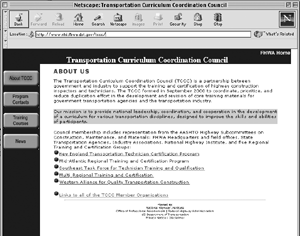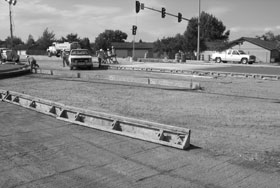U.S. Department of Transportation
Federal Highway Administration
1200 New Jersey Avenue, SE
Washington, DC 20590
202-366-4000
Focus
| Accelerating Infrastructure Innovations |
Publication Number: FHWA-RD-02-011
Date: June 2002
The Transportation Curriculum Coordination Council (TCCC), which was formed in 2000 to improve training opportunities for transportation workers (see September 2001 Focus), recently launched a new Web site to share information nationwide. The site (www.nhi.fhwa.dot.gov/tccc/) includes information on training courses and State programs and contacts, as well as links to regional training and certification programs and news on the latest TCCC work. Recent TCCC initiatives include a proposal for a new pooled-fund study led by the Federal Highway Administration (FHWA), "Transportation Curriculum Coordination Council Training Management and Development." The 5-year study is designed to facilitate national management of the TCCC and develop curriculum and core training materials. For more information on the TCCC or the pooled-fund study, contact Howe Crockett at FHWA, 619-696-7750 (fax: 619-696-7846; email: howe.crockett@fhwa.dot.gov), or Jim Sorenson at FHWA, 202-366-1333 (email: james.sorenson@fhwa.dot.gov).

The Long-Term Pavement Performance (LTPP) program will soon be adding data from an Edgedrain Evaluation study to the LTPP database. Edgedrains, which are installed along roadways, are designed to draw potentially harmful moisture away from the pavement structure. The LTPP program installed the drains at 45 test sites across the country. Under the evaluation performed by the engineering firm Fugro-BRE, inspectors snaked cameras into the drainage pipes to look at the subterranean condition of the drainage systems. The cameras revealed that while some systems were functioning well, others had collapsed, blocked, or otherwise damaged pipes, sometimes caused by rodent or snake nests. Making this data part of the LTPP database means that pavement designers will be able to learn more about when and in what situations edgedrains function the best.
"Designers know that edgedrains can work, and the database is there to provide assistance in identifying the most appropriate situation for edgedrain use," says Jack Springer of FHWA.
 |
| The TCCC's goal is to improve training opportunities for transportation workers. |
Previous FHWA edgedrain studies included Experimental Project No. 12, "Concrete Pavement Drainage Rehabilitation," which began in 1987. Following this project, Demonstration Project No. 87 on "Drainable Pavement Systems" was held in various States in the early 1990s. Currently, a National Highway Institute (NHI) course on "Pavement Subsurface Drainage Design" (Course No. 131026) is available to State highway agencies. The course provides detailed information on pavement subsurface drainage design for new and reconstructed portland cement concrete or asphalt pavements. For more information on the NHI course, contact Robert Baumgardner at FHWA, 202-366-4612 (email: robert.baumgardner@fhwa.dot.gov).
The LTPP team expects to have the site-specific drainage data reports integrated into its database this month. The team will also be releasing a CD containing much of the study's video footage. For more information on the edgedrain study, contact Jack Springer at FHWA, 202-493-3144 (email: jack.springer@fhwa.dot.gov). For more information on the LTPP database, contact the LTPP help desk at 865-481-2967 (email: LTPPINFO@fhwa.dot.gov).